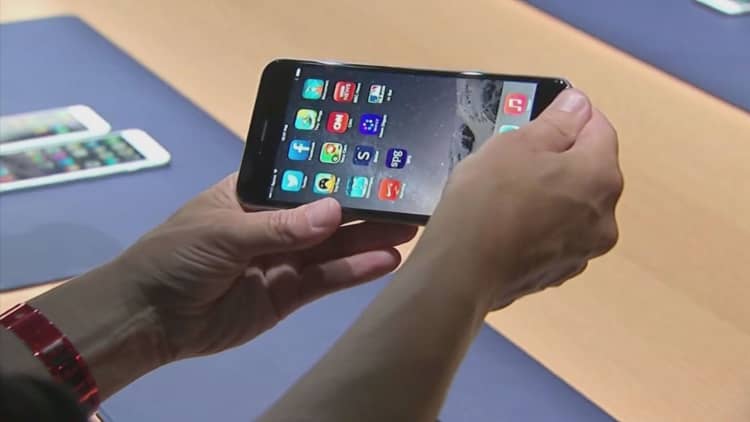
While electronics brands Apple and Samsung have a devoted audience, product shortages may lead some consumers to look elsewhere this holiday season, new data shows.
If they can't provide inventory as the holiday draws closer, the companies could blow an opportunity with some customers: Seventeen percent of consumers said they would immediately seek out alternatives during a shortage of their favorite electronics brand, according to a survey of more than 2,000 consumers from supply chain start-up Elementum.
"Even really strong brands with a lot of brand loyalty aren't immune to this customer change of heart problem," said Rob Cheng, Elementum's head of growth.
Apple faces supply constraints on its iPhone 7 Plus, according to data from firms like Piper Jaffray and Mizuho Securities. Apple doesn't typically give formal order cutoff dates for Christmas, but some versions of the phone now may ship as late as Dec. 19, according to estimates from T-Mobile and Sprint. The jet black iPhone 7 Plus now delivers by Dec. 22, according to Apple.com.
The company also has yet to release a key stocking stuffer, the wireless AirPods for the headphone jack-less phone. While Apple may be able to play up the exclusivity of its phones, the AirPods haven't yet established the same level of "cult loyalty" from consumers, said Barry Kirk, a vice president of loyalty marketing solutions at Maritz Motivation Solutions.
"They're a bit controversial for Apple, they don't come with the phone, they are a pretty high price point," Kirk said. "I would wonder if they have convinced the market yet ... that it's a critical part of the their product lists." An Apple spokesperson was unsure when the AirPods would be available.
Samsung, meanwhile, pulled one of its flagship phones from shelves as part of a global recall, and has yet to offer a new version of the product. About three-quarters of respondents told Elementum that they would lose trust in an electronics brand during a recall, though most said it would recover over time.
Despite these challenges, more consumers are worried that stores will sell out of toys than smartphones or wearable technologies, the study showed.
Part of the reason is "fierce" loyalty. A separate Reuters study found that 91 percent of current Samsung users would likely purchase another Samsung smartphone, and 92 percent of current users would probably buy another Samsung product in general. Similarly, 92 percent of iPhone users would likely buy another iPhone and 89 percent would likely buy another Apple product.
That's because those (and other) electronics brands leverage what Kirk calls the highest form of loyalty, "cult" loyalty, where the brand reflects the users' personal identity. That's compared to most brands, which rely on the lowest forms of loyalty, according to Kirk, either by having the lowest prices or keeping customers in contracts that are hard to escape.
"Cult loyalty involves connecting to all the other people that have made this brand choice. Apple does that. Harley-Davidson, it's like a lifestyle. There's what they call the 'Jeep wave.' It's more social in nature, and that makes it increasingly harder to undo," Kirk said.
Apple sold an iPhone on eBay every five seconds on Cyber Monday and an iPhone 7 every 30 seconds on Black Friday. The Samsung recall also did not hurt U.S. consumers' willingness to buy Samsung phones, according to the November Reuters poll.
"What we are seeing is that the customers that would have bought the phone are waiting. They are loyal to the Android phone and Samsung," Best Buy CEO Hubert Joly told reporters in November. "There's a segment of those customers who really like that 'phablet' product, and there isn't one that satisfies them right now."
That said, there's no telling how many more phones or headphones would be sold had they been on the shelves.
Apple's iPhone 6S, for instance, was the fourth-best selling electronics device on Black Friday on eBay last year. This year, it did not make the top five.
Inexpensive Bluetooth headphones saw some of the biggest one-day volume spikes on Amazon and eBay early this week, as did the refurbished Samsung Galaxy Note 4, an older version of the recalled phone.
As the holidays draw nearer, at least one consumer's patience may be waning, based on an unverified email posted by Apple blog Mac Rumors.
"Give us a release date," a consumer reportedly wrote to Apple. "I really bought in to the wireless vision you painted. Now I'm stuck waiting with my EarPods but can't charge my 7 at the same time which I need to do at work. Let us know if it's a month or 6 months, because then I'll just buy some other wireless headphones."
Even if a small percentage of consumers make the switch, it could make or break the quarter for a brand, Cheng said.
"We talk to a lot of supply chain executives, and I guarantee that none of them believe that the appeal of an exclusive or rare item overcomes the damage that it would do for the brand if the customer was not able to get a product for the holiday," Cheng said.
— CNBC's Courtney Reagan contributed to this report.


